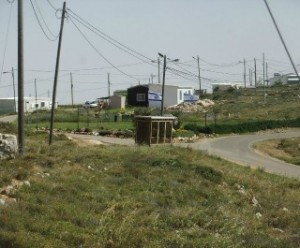 We know that pro-Israel does not mean blindly
supporting policies that are irrational, reckless, and counter-productive. Pro-Israel means supporting policies
that are consistent with Israel's interests and promote its survival as a Jewish, democratic state.
We know that pro-Israel does not mean blindly
supporting policies that are irrational, reckless, and counter-productive. Pro-Israel means supporting policies
that are consistent with Israel's interests and promote its survival as a Jewish, democratic state.
You've heard the arguments of the religious and political right-wing, and so have we. They've had their say. Now, we'll have ours.
Go HERE for all installments of APN's "They Say, We Say"
They Say, We Say: What About Jerusalem and Hebron?
Israelis and Palestinians can buy property in East Jerusalem. Why is that a problem – unless you are in favor of discrimination against Jews?
On the other hand, the Palestinian side of the real estate market – the potential buyers – is artificially limited. Palestinians who do not have legal residency in Jerusalem (i.e., Palestinian residents of the West Bank and Gaza, Palestinians living abroad – including Palestinians who might have been born in or have parents born in East or West Jerusalem) are barred from living in the city. Palestinian West Bankers cannot, for all intents and purposes, purchase land in Jerusalem, and they are entirely prohibited from doing so on State controlled lands (which accounts for most of the city). Those who do own land in the Jerusalem may not access it freely, since as non-residents they have no legal right to enter or stay in the city without a special permit from Israel.
Palestinians who do have legal residency in East Jerusalem are a marginalized, underserved collective of around 350,000 people. While these Palestinians technically have the right to purchase property anywhere in the city, in reality there are very few instances of Palestinians purchasing property in Jewish West Jerusalem – reflecting both the fact that their lives and communities are in the Palestinian part of the city, and the fact that Israelis do not want to sell to them. Underscoring this fact is the case Nof Zion, a settlement project in Jabel Mukabber. When that project was failing financially (for lack of Israeli buyers), a wealthy Palestinian sought to purchase the development from the creditor, offering a price higher than any Israeli bidder. His effort was thwarted by an organized and very public campaign to block the sale for the declared purpose of keeping the property in Jewish Israeli hands. The property was subsequently sold to a Jewish Israeli businessman and is now a large Jewish-populated settlement. And even in this example, small symbols can sometimes disclose large truths: in Jabel Mukabber, sidewalks line the road only in the area bordering the settlement; when the road enters the built-up Palestinian areas, the sidewalks disappear.
 This morning the Army Radio reported that the committee established by the government to find a
solution of the illegal outposts issue recently submitted a legal opinion to the Attorney General according to
which it is possible to use the absentees’ property in the case of the illegal outpost of Amona. The committee’s
idea is to take private Palestinian lands in the nearby plot to where Amona is today, whose owners do not live
in the West Bank, and lease them to the settlers of Amona through a lease that will be renewed every three
years. This way, the settlers of the illegal outpost, which must be evacuated by the end of December due to a
High Court ruling, will be able to live close by to where the outpost is located today. AG Avichai Mendelblit
will soon announce whether he intends to accept or reject the legal opinion.
This morning the Army Radio reported that the committee established by the government to find a
solution of the illegal outposts issue recently submitted a legal opinion to the Attorney General according to
which it is possible to use the absentees’ property in the case of the illegal outpost of Amona. The committee’s
idea is to take private Palestinian lands in the nearby plot to where Amona is today, whose owners do not live
in the West Bank, and lease them to the settlers of Amona through a lease that will be renewed every three
years. This way, the settlers of the illegal outpost, which must be evacuated by the end of December due to a
High Court ruling, will be able to live close by to where the outpost is located today. AG Avichai Mendelblit
will soon announce whether he intends to accept or reject the legal opinion.
